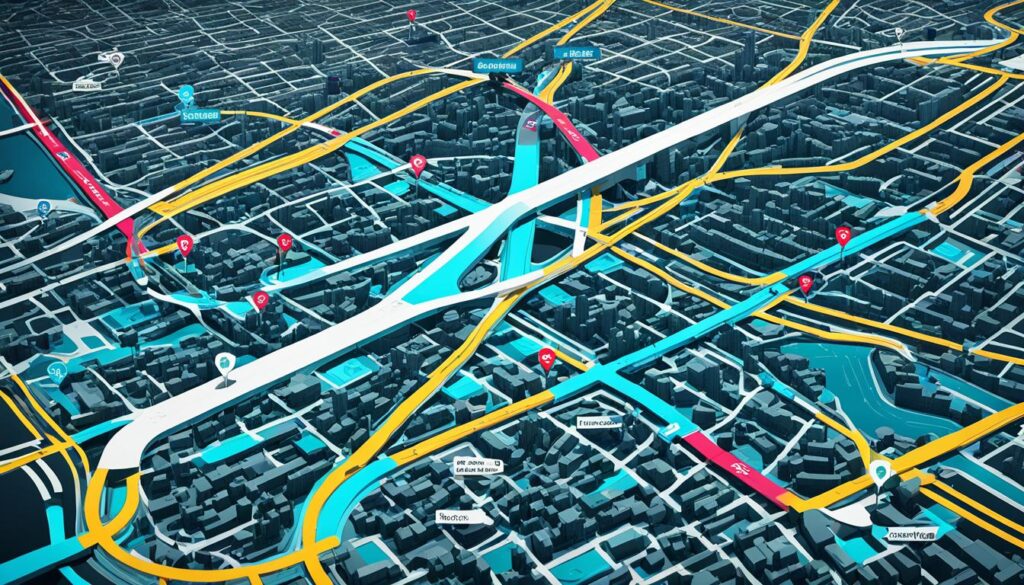Adverts
Who doesn't remember the last time traffic held us back mercilessly, without a visible alternative route? This scenario is familiar to everyone. However, advances in the field of artificial intelligence are revolutionizing our interaction with GPS apps.
Today, thanks to these innovations, we enjoy not only voice navigation, but detailed guidance on traffic conditions, accidents and road closures in real time, directly on our mobile devices.1. The combination of artificial intelligence and GPS apps enriches the journey experience, making it more productive and simple.
Adverts
Google Maps is one of the prominent services. It offers real-time traffic information and integrates with music apps so navigation is uninterrupted1. Additionally, Waze puts the ability to share data on local fuel prices in the hands of users, embracing a community philosophy that benefits everyone involved.1. For those who frequent unfamiliar roads, HERE WeGo allows you to access maps even without an internet connection, ensuring that the desired directions are always available12.
The ability of AI systems to correct routes in real time reduces possible setbacks, always providing the most advantageous alternative, even in the face of unforeseen events. These advancements connect and inform us in ways never before, making every travel experience more effective and enriching than before.
Adverts
The Evolution of Artificial Intelligence in Navigation Applications
The use of artificial intelligence in navigation applications is transforming users’ interaction with these tools. Approximately three-quarters of consumers engage with AI across different services, often unconsciously. This includes navigation services3.

The Role of AI in GPS Navigation
Mobility apps, enriched with artificial intelligence, absorb and analyze data from multiple sources. These include GPS signals, information from smartphones and data from traffic sensors. Thus, they provide real-time updates on street conditions4. This is possible thanks to the use of machine learning techniques in the analysis of vehicle patterns. As a result, the applications propose alternative routes dynamically and adjusted to each user4.
How AI Improves Real-Time Traffic Data
These apps are capable of suggesting more efficient and safe routes through anticipation based on historical data. This procedure not only shortens travel time, but also contributes to the safety of drivers and passengers. Real-time alerts about risks on the route, such as construction areas and accidents, reduce the chances of unforeseen events4.
Use Cases: Companies Using AI in Their GPS Apps
Most notably, companies like Google and Waze have become at the forefront of adopting artificial intelligence in navigation. Google Maps, for example, uses AI to adjust routes, doing so based on real-time traffic information. Waze, by integrating user data with AI technologies, provides a more personalized journey. MapMetrics, a Web3 navigation application, differentiates itself by improving data collection using AI. This results in accurate navigation suggestions tailored to each context4.
See too:
New Features in AI GPS Applications
The integration of artificial intelligence revolutionizes GPS navigation, providing a personalized and agile approach to user demands. Thanks to personalized navigation with AI, it is possible to adapt the routes according to the preferences of each individual. Intelligent routing, using AI, provides instant redirections considering current traffic conditions.
AI Voice Navigation
Navigation apps are increasingly adopting AI-based voice navigation. This implementation aims to make the user experience more natural and secure. With this system, in addition to receiving directions, the driver is alerted about unforeseen events and changes in traffic in real time.
Intelligent Routing and Instant Redirects
The AI-driven intelligent routing feature constantly monitors traffic conditions. This makes it possible to offer instant redirections, improving route efficiency. Google Maps stands out in this regard by using AI in more than 220 locations to deliver accurate traffic updates and offer automatic reroutes.
Furthermore, the introduction of real-time speed limit information in Europe, powered by artificial intelligence, is being expanded to 20 countries5.
Route Customization with User Preferences
One of the great innovations of AI GPS apps is their ability to customize routes based on the user's preferences. The Sygic application, renowned for its offline navigation, has adopted Signal Recognition to increase user safety and convenience6. The combination of this functionality with fast analysis algorithms and instant responses makes AI navigation crucial for any type of trip, from everyday commutes to leisure adventures.
Top GPS Apps with AI Updates
Leading GPS applications have devoted significant attention to artificial intelligence-driven refinements. These innovations aim to improve the guide and offer users a more precise and efficient operating experience.
Google Maps: AI Updates in 2023
In the year 2023, Google Maps saw itself enriched by several AI updates. These reforms had a direct impact on the user experience, ensuring more detailed and reliable navigation through the integration of updated traffic data and internal mappings. The combination of barcode technology with RFID tags, modeled after Amazon's tracking system, promises to ensure constant real-time updates for its users7.
Waze: How Community and AI Work Together
Waze has distinguished itself for its ability to unite community and artificial intelligence. Such synergy has generated a collaborative database based on community input, culminating in in-depth traffic alerts and accident predictions. In this conjunction, the application explores the potential of collaboration and technology, perpetually enriching the virtual journey of its users7.
Sygic GPS Navigation, Maps
“Sygic GPS Navigation, Maps” app is an advanced navigation tool that offers offline maps and real-time voice guidance. With it, you can plan detailed routes, avoid traffic jams using live traffic information, and find points of interest like restaurants and gas stations.
Sygic also includes features such as 3D map viewing, free map updates, and integration with location services, providing a safe and convenient navigation experience ideal for both drivers and pedestrians.
How New AI-Powered Updates and Improved GPS Apps Are Transforming the User Experience
Advances in AI have revolutionized the everyday usefulness of GPS systems. Now, they offer real-time route adjustments. These features are combined with traffic and danger alerts, considerably increasing the application's effectiveness.
These improvements open the door for integrations with different services, such as ride sharing and social networks. In this way, the user journey becomes more complete and rich, highlighting the power of technology to improve our everyday lives.
Accuracy and Efficiency with Real-Time Route Corrections
Now, AI GPSs reach a new level of accuracy. They can, in real time, adjust the route using complex algorithms. This feat substantially improves the driver's experience, highlighting how technology can facilitate the most common activities.
Real-Time Traffic and Hazard Alerts
The alerts provided, also in real time, change the way we move. With great accuracy, they notify about accidents and road inspections. This anticipation of events allows you to avoid unwanted delays, improving the safety and efficiency of travel.
Integration with Other Services and Applications
However, integration with will add more to the user experience. For example, with ride sharing, you can compare and choose the best route quickly. The use of social networks aims to facilitate communication, allowing you to share information with friends.
More generally, AI brings a range of advantages that impact several sectors, including legal8. There is a growing adoption of this technology in the legal environment, fueled by the need for more efficiency and the expansion of the field. Therefore, we can expect a scenario where innovation and legal technology are essential8.
Conclusion
Recent updates, led by Artificial Intelligence (AI), and the advancement of GPS applications mark a significant transition to smarter, more connected mobility. Google Maps, for example, has achieved an accuracy rate of over 97% in predicting arrival times, benefiting approximately 97% of global users9. Collaboration with DeepMind has in turn optimized traffic forecasts in several major cities, including Berlin and São Paulo, making the commuting experience more harmonious and efficient9.
Among the new features offered by these AI-enhanced applications, we highlight voice navigation, intelligent routing and instant redirections, promoting practicality and safety for drivers. This fusion of artificial intelligence and GPS technology has played a key role in urban traffic management. This translates into less congestion, thus favoring more sustainable mobility9. It is worth highlighting Google Maps' ability to avoid traffic jams, guiding drivers along alternative routes, as one of the notable achievements of this technological union9.
The application of AI in main navigation services such as Google Maps, Waze and Apple Maps points to the beginning of a new digital era in traffic management. Through a constantly improving infrastructure, these systems are able to quickly adapt to changes in traffic patterns, even in the face of disruptive events, such as the pandemic. The gains provided by this evolution are real and progressive9. In summary, the interaction between AI and cutting-edge GPS projects a scenario where future mobility is characterized by increasing efficiency, personalization and connectivity.





